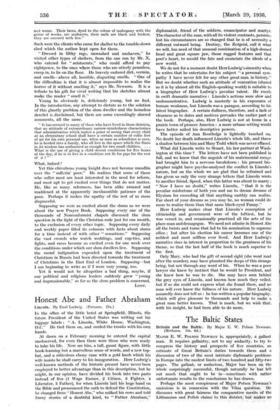Honest Abe and Father Abraham Lincoln. By Emil Ludwig. (Putnam.
21s.) IN the office of the little hotel at Springfield. Illinois, the future President of the United States was writing out his luggage labels : " A. Lincoln, White House, Washington, D.C." He tied them on, and corded the trunks with his own hands.
At dawn on a February morning he entered the capital unobserved, for even then there were those who were ready to take his life. Now see him, a tall, gaunt figure, with little book-learning but a marvellous sense of words, and a new top- hat, and a ridiculous ebony cane with a gold knob which his wife insists he shall carry to his inauguration. Herr Ludwig's well-known methods of the historic present have -never been employed to better advantage than in this description, but he might, in our opinion, have divided his book into two parts instead of five (1 Wage Earner, 2 Citizen, 8 Fighter, 4 Liberator, 5 Father), for when Lincoln laid hii huge hiia on the Bible and pronounced the oath to defend the tOnstitution, he changed from " Honest Abe," who milked his cows and told funny stories of a doubtful kind, to " Father Abraham," diplomatist, friend of the soldiers, emancipator and martyr. The character of the man, with all its violent contrasts, persists ; but his circumstances are so changed that he is of necessity-a different outward being. Destiny, the Zeitgeist, call it what we will, has need of that unusual combination of a high-domed head and great square jaw, those rugged features and that poet's heart, to mould the fate and enunciate the ideals of a
new world. .
We do not for a moment doubt Herr Ludwig's sincerity when he writes that he entertains for his subject "• a personal sym- pathy I have never felt for any other great man in history." But we doubt whether such an attitude of veneration (shared as it is by almost all the English-speaking world) is suitable to a biographer of Herr Ludwig's peculiar talent. He excels in swift dramatic narrative : Lincoln's actions were slow and undemonstrative. Ludwig is masterly in his exposures of human weakness, but Lincoln was a paragon, according to his latest biographer. A certain dullness, therefore, and a lack of clearness as to dates and motives pervades the earlier part of the book. Perhaps, also; Herr Ludwig is not at home in a prairie town of pioneer America : a more urbane setting would have better suited his descriptive powers. .
The episode of Ann Routledge is lightedly touched on. No doubt her death influenced Lincoln's whole life, and threw a shadow between him and Mary Todd which was never effaced.
What did Lincoln write to Stuart, his law partner at Wash- ington at this time ? The letters have not been published in full, and we know that the anguish of his matrimonial escape had brought him to a nervous breakdown : . his present bio- grapher might have psycho-analysed the conflict in Lincoln's nature, but on the whole we are glad that he refrained and has given us only the very strange letters that Lincoln wrote to another friend, Speed, when this latter was about to marry ; " Now I have no doubt," writes Lincoln, . " that it is the peculiar misfortune of both you and me to dream dreams of Elysium far exceeding all that anything earthly can realize. Far short of your dreams as you may be, no woman could do more to realize them than that same black-eyed Fanny."
Herr Ludwig makes clear that Lincoln's conception of citizenship and government were of the loftiest, but he was versed in, and occasionally practised all the arts of the place-man and demagogue. We need not admire in Honest Abe all the twists and turns that led' to his nomination to supreme office ; but after his election his career becomes one of the noblest and most selfless ever lived. And Herr Ludwig's narrative rises in interest in proportion to the greatness of his theme, so that the last half of the book is much superior to the first.
Only Mary, who had the gift of second sight (she went mad after the murder), may have plumbed the deeps of this strange being, but not through any word of his. When he was a poor lawyer she knew by instinct that he would be President, and she' knew how he was to die. She may have seen behind the grey eyes of Lincoln, and known how much they veiled, but if so she could not express what she found there, and no man will ever know the fullness of his nature. Herr Ludwig assuredly does not tell us : he has written a popular biography, 'which will give pleasure to thousands and help to make a great man better known. That is much, but we wish that, with his insight, he had been able to do more.














































 Previous page
Previous page